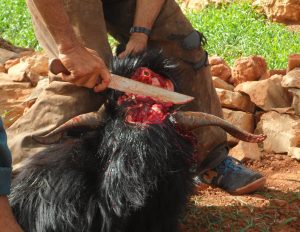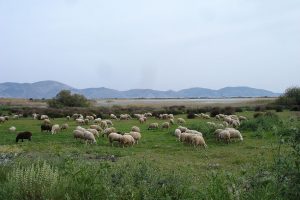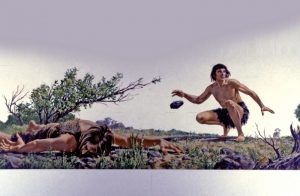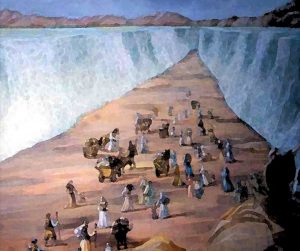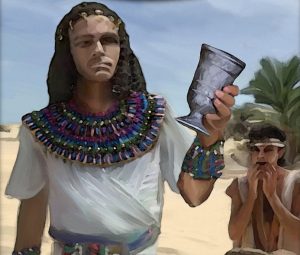Amazigh Proverbs from the Newspaper Agraw Amazigh
Those Before Us Have Spoken
Our ancestors didn’t leave us anything to say; they’ve said it all.
1. Today at your place, tomorrow at mine.
Emphasizes the need to help each other, since we are all vulnerable to the same types of problems.
2. Weaving at night brings a big laugh in the day.
Weaving at night (when you can’t see) results in a laughable outcome (which you only realize when the daylight comes). If you don’t work/buy/etc. in proper conditions, the outcome will be less than desirable.
3. Feed your enemy first, then kill him.
Emphasizes the importance of hospitality.
4. Dress your children up nicely; people don’t know what they’ve eaten.
People care about and notice the outward appearance. If you want respect and to avoid gossip, dress your kids well. What you feed them isn’t at all important, since people don’t see that. Appearances matter.
5. Play with a puppy, and he’ll lick your mouth [which is not desirable].
Normally one should be firm with a dog, since it is meant to do work for you. It is not a pet as in France. If you aren’t firm, the dog will take advantage of you. In the same way, treating certain people or certain classes of people in certain ways may result in their passing certain social limits with you and taking advantage of you.
6. God will not take the cat away from the mice.
Can be said, for example, when the authorities catch a criminal. This extols the power of authority.
7. The thing is better than its price.
When people value something they gladly pay for it. They want the thing more than the money it takes to buy it.
8. They fought over the feeding trough before they had the donkey.
Can be said when people are arguing about things that aren’t currently relevant or won’t matter until sometime in the future.
9. There are no bees without stingers.
When you choose to interact with potentially dangerous or nasty people or situations, don’t be surprised if you get hurt.
10. Only a jujube tree keeps the grass around it.
A jujube tree has thorns and so keeps people and animals from coming near it and ruining or eating the grass around it. This proverb can be said to disapprove of the stingy person who defends his possessions against the desires of others. It can also be said to illustrate the modest possessions that a generous and helpful person may have.
11. Boastfulness doesn’t fill up sacks.
Boasting is empty and nothing compared to real actions.
12. They don’t run when they aren’t fed.
You can’t get something without giving something.
13. The mill doesn’t grind without grain.
Words and promises are empty. There need to be actions, deeds, something concrete.
14. One horseman doesn’t stir up dust.
Emphasizes the importance of community, working together.
15. Only a bull licks itself.
Said to a proud person, someone enamoured with himself.
16. Only the dead are silent.
Used to encourage someone to speak up for his rights or just to encourage a silent person in a group to say something.
17. A wolf doesn’t save pieces of meat.
Don’t be like the wolf, which eats the entire lamb right away and doesn’t save any. Instead, think about and plan for the future.
18. Only clay stops water.
Said to encourage the giving of a real solution, not just a partial or inadequate solution.
19. There is no glory without death.
Emphasizes the need for sacrifice. No pain, no gain.
20. It’s only the empty grain that the wind takes away.
Failing at something you didn’t prepare for or work for shouldn’t be surprising.
21. Only a snake goes on its stomach.
Said to dissuade or disapprove of secret, sneaky, or dishonest actions.
22. The sickle cuts only the hand of the novice.
Said to encourage experience and intelligence.
23. If you didn’t do anything, don’t fear anything.
If you are innocent, you have nothing to fear.
24. What you are saying to me, say to yourself.
Said to a hypocrite.
25. He who gathers the wood will be warm by it.
You need to rely on yourself and not be dependent on others. The one who does the work will benefit from it.
26. He who hits himself doesn’t cry.
Don’t complain about problems that are of your own doing.
27. He who let it cool never ate it [the “it” being food or a meal literally].
Act now while the opportunity is there. Strike while the iron is hot. Also said of love: if you let the relationship “cool down,” don’t expect it to last. She/he will go somewhere else and leave you.
28. He who is holding the sky above us, let him drop it on us.
Said to or about someone who is pretending to be great and hold power over us. “You think you hold up the sky over me? Go ahead, drop it on me. I don’t fear you. Only God is the one who holds that kind of power.”
29. He who has been frightened by a snake, even a rope makes him jump.
Previous bad experiences can cause us to react strongly to things that even just resemble those experiences.


